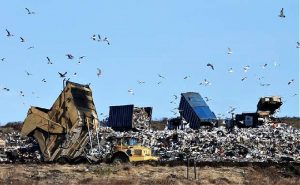
Doomsday scenario: Rhode Island’s single landfill receives 722 tons of food waste a day and could run out of space by 2040
Many school administrators in the state of Rhode Island are ignoring a new law to divert food waste from landfills, leaving students to carry the burden of persuading over-worked school staff and reluctant fellow students, according to a new survey launched by two high school activists.
The law is one of only six in the US and is viewed as a major response to the growing threat of climate change at the state level. It took effect on January 1 last year and requires all schools in Rhode Island that produce more than thirty tons of organic waste a year, or lie within 15 miles of a composting facility, to compost or recycle the waste and donate unused food to food banks.
In spite of its importance, the law suffers from a lack of enforcement provisions and funds according to Emma Pautz and Bella Quiroa, two rising seniors at high schools in Rhode Island who also advise The Advocacy Project. As a result, implementation of the law is left to schools that are struggling with many other competing priorities and threatened by budget cuts.
Ms Pautz and Ms Quiroa have launched a survey and petition, the Youth Composting Campaign Initiative, to drum up support for the law. They presented preliminary findings recently at a composting conference sponsored by Rhode Island College in Providence, the state capital.
Of the 74 teachers to have responded to the survey so far, 65% had not heard of the mandate and only 9% reported that they had a “strong” composting program that involves students. Ms Pautz described this as deeply discouraging. “Obviously, it is not good enough” she said in her presentation.
*
Rhode Island is blessed with a spectacular coastline and is heavily dependent on tourism, but both are at serious risk from garbage and climate change, according to speakers at the recent conference.
The state has one landfill and at the current rate it will fill up by 2040, forcing Rhode Island to export waste to other states at a sharply higher cost than the current $58.50 a ton. Alarmed legislators are considering a bill to impose a surcharge of $2 a ton on all garbage collected to encourage new thinking.
Food waste should be the first target according to Josh Daly, associate director at the Rhode Island Food Policy Council. The state sends 722 tons of food waste a day into the landfill where it is converted into methane gas, one of the deadliest greenhouse gases, he said.
The federal government’s Environmental Protection Agency is also urging states to focus on the linkage between food waste and climate change and has offered Rhode Island $50 million to implement a climate action program. Of this, around $2 million is earmarked for food waste.
Ms Pautz and Ms Quiroa are also outraged that so much food is going to waste in a state where under-nutrition is high among low-income families and minorities. Almost 14% of all Rhode Island households receive supplemental food from the government.
*
The looming threat from climate change is producing a generation of student leaders who are, in the words of Emma Pautz, “terrified” by what lies ahead.
Ms Pautz herself was inspired by Greta Thunberg, the Swedish climate activist, at the age of 12. Soon after arriving at the Barrington High School, where she studies, Ms Pautz got two composting bins set up in the cafeteria and persuaded other students to join her in monitoring the bins. The nearby Barrington Farm School collects the waste for free on an electric bicycle, and by last summer Ms Pautz’s team was diverting over 12 gallons a week.
Bitten by the green bug, Ms Pautz spends weekends clearing nature trails and draws praise for her commitment. “Emma has a passion for environmental projects and doesn’t let anything stop her,” said Amy Nicodemus, Ms Pautz’s school advisor. “I wish we had more young people with her drive!”
Bella Quiroa, the campaign co-leader, came to composting through an internship at Clean Ocean Access, a non-profit in Newport, that enabled her to introduce composting to younger students at five other local schools. Last Halloween she collected over 80 discarded pumpkins from local farms and held a carving competition, Carving for Compost, for students and families.
“The pumpkin guts and bits were composted as people carved, and the excess pumpkins were donated to a local farm for their cows to eat,” said Ms Quiroa. “The idea was to raise money in a fun way and protest the fact that so many pumpkins go to waste and end up in landfills.”
Ms Quiroa has also given composting presentations at her church in Spanish and English, using 5-gallon buckets donated by local businesses. “It is so rewarding to work with communities!”
*
For all their achievements, the experience of Ms Pautz and Ms Quiroa also exposes the limits to student activism.
Several participants at the recent conference noted that younger students at elementary and middle schools are open to composting because they accept direction and like new ideas.
But high school students are more resistant to authority and can be resentful of initiatives by other students, said Ms Pautz. She recalled one student who tossed several uneaten apples into the trash bin in front of her, as an act of spite. “Monitoring food scraps is not seen as cool,” she said. “Most kids would rather sit and talk to their friends.”
This has not deterred Ms Pautz. One of her fellow composters, Sabine Cladis, said that they regularly stand up on chairs and “yell” at other students. “We can be pretty aggressive!”
But Ms Pautz also complained that their campaign had been undermined by her school board, which suddenly decided to take over composting from students last summer. “When we turned up for the new school year, the bins were gone. When I asked what had happened, they said ‘Oops – we forgot.’”
This forced the students to start from scratch, and they are currently collecting less than a quarter of the 12 gallons a week they binned last summer. Ms Pautz added that the Board’s inaction had sent a message that composting was not seen as a priority by the school authorities, weakening her standing in the eyes of other students.
At the same time, Ms Pautz conceded that school administrators have many other worries on their plate. Her own school is facing a serious funding deficit and is also struggling to implement a state ban on smoking.
Composting in schools presents other challenges. Several respondents to the student survey noted that food service in their schools is outsourced to Chartwells, a catering company, and called on the company to do more to support composting in school kitchens and cafeterias. Chartwells did not respond to a request for comment for this article.
Finally, it is sinking in that Ms Pautz and Ms Quiroa will graduate next summer, and that their efforts will probably come to an abrupt halt if they cannot coopt other students to take over when they leave. “Sustainability is a big worry,” said Emma.
*
If students play a key role in implementing the state ban, teachers are uniquely placed to help.
Tyson Edmonds, a teacher at the The Prout School in the town of Wakefield, offers a course on environmental justice that has inspired his students to compost up to five gallons of food waste a day in the school cafeteria, for use on the school garden. Several students attended the conference last week and were quick to sign the survey and petition by Ms Pautz and Ms Quiroa. Some have started composting at home.
Katie Bowers, a teacher at the Birchwood Middle School in Providence and compost enthusiast, said that it requires constant effort to keep students interested and come up with new ideas. These have included “zero waste days” and encouraging students to plant a mixture of squash, beans and corn which she calls the “Three Sisters.”
But this is definitely producing a change in behavior, said Ms Bowers. More and more students are putting food scraps to one side on their lunch trays, making it easier to toss the waste into the bins.
Ms Bowers also said that teachers can act as cheerleaders with school custodians, who manage school garbage, and with catering staff. After some initial skepticism, the kitchen staff at Birchwood are now solidly behind composting and help by putting scraps and unused food to one side when they clean out fridges and salad bars.
Ultimately, however, “change must come from the top” in any school, said Ms Bowers. While a new district school superintendent can breathe life into a food waste plan, the reverse can also happen. The principal at Barrington High is new and the superintendent of the school district will retire this year. Ms Pautz’s advocacy with school authorities appears to be back to square one.
*
For all the zeal shown by state legislators in passing the ban, there appears to be little stomach for tougher enforcement that would put more pressure on school boards and principals.
Nor does the state seem ready to offer more funding, with the exception of climate-related money, although experts feel money should not be a significant impediment.
The waste from the Barrington High School is picked up for free. While other schools pay for haulage, the cost rarely exceeds $50 a week for smaller schools according to Justin Sandler at Black Earth Composting, which works with around 15 schools in Rhode Island and charges $24 to haul a 64-gallon bin. “If they really want it, schools find the funding,” he said.
One source of funding is 11th Hour Racing, a foundation that has supported two nonprofits working with schools, the Rhode Island Recycling Project and Clean Ocean Access.
Jim Corwin, a co-director at the Recycling Project, said that his group has helped 13 schools to launch composting in the Providence area. Between them they have diverted 100 tons of waste and recovered 13 tons of unused food in the last three years. The Club has also made the case for composting with principals and school boards, including at the Birchwood School.
Elsewhere in the state, however, food waste diversion suffered a major reverse earlier this year when Clean Ocean Access unexpectedly closed down without any public explanation. The group had supported composting at 11 schools on Aquidneck Island, which includes the district of Newport, and sponsored Bella Quiroa’s outreach to elementary students. Advocates say that that the group’s demise has further undercut the state’s faltering efforts to implement the ban.
*
If Bella Quiroa and Emma Pautz are unnerved by the pressures, they did not show it at the recent conference. Judging from their survey, most schools are unaware that the state ban even exists, and the two students plan to change this by making as much noise as possible. Their petition has attracted over 700 signatures in less than a month and they plan to use this in approaching the media, schools, boards and legislators.
“We need to get some urgency into this,” said Ms Pautz. “It’s as simple as that.”

Managing climate change: Bella Quiroa, left, and Emma Pautz, right, join Sarah Lavallee and Maggie Lauder in cleaning up Newport beaches, which have been battered by storms
*
Posted By Iain Guest
Posted Mar 24th, 2024



